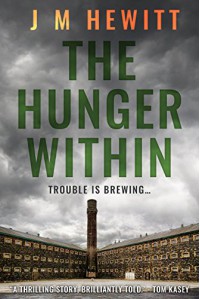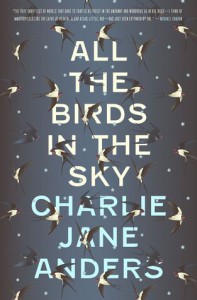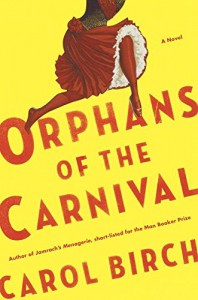Summer Reading Project, BookLikes Satellite
Never stop reading. (Content originally posted at Blogger.)
The Infidel Stain, by M.J. Carter

One of the lesser tropes of detective fiction is that the detective knows he or she is on the right track when some goon appears and tries to warn them off, sometimes violently. The problem with this method of mystery-solving in M.J. Carter’s The Infidel Stain (sequel to the very enjoyable The Strangler Vine) is that Jem Blake and William Avery uncover so much dirty laundry that they get attacked by a variety of goons under orders from several different characters. It’s a wonder that the pair of them survive the book in one piece...
Read the rest of my review at A Bookish Type.
 1
1
The Longest Night, by Andria Williams

Being a military wife is a tough job. Being a military wife whose husband is assigned to a poorly constructed reaction in the middle of a cover up is even worse. Being a military wife with a husband in that situation who is then sent to Greenland is the worst. The fact that the military wife in this situation, the protagonist of Andria Williams’s The Longest Night, also has to contend with being pregnant and the close, almost Puritanical scrutiny of the other military wives puts her beyond even the superlative...
Read the rest of my review at A Bookish Type.
 2
2
The Hunger Within, by J.M. Hewitt

At the height of the Troubles, one would think that any normal people would keep their heads down and wait for a lull in the general violence. But in J.M. Hewitt’s short novel, The Hunger Within, five people get so tangled up in each others’ misery and anger that it’s just a matter of time before someone ends up dead...
Read the rest of my review at A Bookish Type. I received a free copy of this book from NetGalley for review consideration.
Euphoria, by Lily King

Culture is so pervasive that it’s hard to see its influence unless you step outside of it. While Euphoria, by Lily King, is about anthropologists studying the tribes around the Sepik River in Papua New Guinea, it is also a story about what happens when Westerners travel into the jungle and forget to behave. The irony would be delicious it if weren’t for the sheer tragedy of the story...
Read the rest of my review at A Bookish Type.
Bardo or Not Bardo, by Antoine Volodine

Antoine Volodine’s Bardo or Not Bardo (translated by J.T. Mahany) is another book for the “what the fuck did I just read?” files. The summary on Goodreads makes sense: seven chapters show seven different characters (many of them named Schlumm) fail to achieve enlightenment while traveling through bardo and end up being reincarnated back on earth. I was initially attracted to this book because the review I read said this book was a humorous take on characters struggling in bardo; I was hoping for something a bit like Christopher Moore’s A Dirty Job or Secondhand Souls. This book is nothing like Moore’s work. It’s too weird and disjointed for comfortable reading. There were some parts that made me chuckle, but mostly this book just bewildered me...
Read the rest of my review at A Bookish Type.
 1
1
The Grace of Kings, by Ken Liu

Power, like nature, abhors a vacuum. If you didn’t already know this, you will after reading The Grace of Kings by Ken Liu. This fantasy novel begins with the death of an emperor who had hoped to completely transform his world through the next several years of near constant warfare as various warlords and would-be kings try to carve out their own territory...
Read the rest of my review at A Bookish Type.
 2
2
The Guineveres, by Sarah Domet

The girls in Sarah Domet’s The Guineveres have so much going against them. They’ve been abandoned by their parents to the tender mercies of Catholic nuns. The nuns do their best, but their best includes lectures on how sinful these girls are and lots of punitive chores. The girls are always a little hungry, a little cold, and have to go without the comfort of anyone’s affection. Their only goal is to escape the convent, but most of their plans are like unfunny versions of the Underpants Gnomes’ plan. The Guineveres, narrated by Vere, covers the last years the four Guineveres lived at the convent and how they eventually left...
Read the rest of my review at A Bookish Type.
 1
1
This House is Mine, by Dörte Hansen

Generally speaking, home is the place where we belong. Our family are there. Our memories remind us of the time spent there. If nothing else, home is where we keep our stuff. But while Dörte Hansen’s This is House is Mine (translated by Anne Stokes) centers on a house in Germany’s Altland region, many of the characters feel perpetually homeless. They are refugees—sometimes literally, sometimes figuratively...
Read the rest of my review at A Bookish Type. I received a free copy of this book from NetGalley for review consideration.
 1
1
The Food of a Younger Land, edited by Mark Kurlansky

Growing up in the 1980s and 1990s, I grew up on a blend of midwestern and Texan food (my parents come from opposite parts of the country) and as much junk food as I could sneak past my mom. (Sorry, mom.) I ate casseroles, Tex-Mex (Mexican food as interpreted by Texans), what my dad called “southern gourmet” dishes like biscuits and gravy, and lots of Italian dishes that my mom had taught herself. As I’ve gotten older, I’ve become fascinated by food history. Why do we eat what we eat? How old is this recipe that my mother and her mother make? Mark Kurlansky’s The Food of a Younger Land answered some of my long-standing questions, as well as introducing me to American cuisine prior to World War II and the interstate highway system...
Read the rest of my review at A Bookish Type.
 3
3
The Chosen Ones, by Steven Sem-Sandberg

Steven Sem-Sandberg’s The Chosen Ones (translated by Anna Paterson) is a difficult book to read. First, there is the subject matter. Even though The Chosen Ones is a novel, it is closely based on the actual history of the victims and perpetrators of Aktion T4, the Nazi euthanasia program for people designated “unworthy of life.” Second, the style of the book—dense paragraphs that read like nonfiction more often than not—is relentless. I never got a break from the details of Aktion T4 and its effects on the children that got caught up in its monstrous betrayal of everything medicine is supposed to stand for...
Read the rest of my review at A Bookish Type.
Nineveh, by Henrietta Rose-Innes

I never read Hal Herzog’s Some We Love, Some We Hate, Some We Eat, but the title has always stuck with me as an excellent way to sum up humans’ relationship to the other species on this planet. Nineveh, by Henrietta Rose-Innes, is very much about the “some we hate” category. The critters in this category—rodents, insects, reptiles, etc.—have done nothing to earn our enmity. They just gross us out or scare us for being what they are: low level predators, occasional disease vectors, destroyers of the wooden frames of our houses. The protagonist of Nineveh, Katya Grubbs, doesn’t hate any animals. She runs Painless Pest Relocation. Instead of trapping or poisoning pests, she collects them and moves them into the remaining wild areas around Cape Town. She is the Sisyphus of pest removal...
Read the rest of my review at A Bookish Type. I received a free copy of this book from NetGalley for review consideration.
Odessa Stories, by Isaac Babel

Russian literature has (deservedly) a reputation for being utterly depressing and heavy—which is why it’s always a delight to find comic writers like Teffi and Isaac Babel. The humor in these authors’ stories and feuilletons is caustic and sharply observed, but still makes me smile and chuckle. This week I read Isaac Babel’s classic collection, Odessa Stories (translated by Boris Dralyuk), about Jewish life in Odessa in the early twentieth century. The collection is night-and-day from his collection Red Cavalry, as one might expect, but it shares similar themes of violence and chaos without being as gutting as Red Cavalry. Odessa Stories is packed with gangsters, tsarist and communist officials, pigeons, and a lot of slapstick...
Read the rest of my review at A Bookish Type. I received a free copy of this book from NetGalley for review consideration.
All the Birds in the Sky, by Charlie Jane Anders

The future is impossible to predict, which is why I’m always surprised that some people are so willing to give credence to prophecies and visions. There are two many factors at play to say for certain what’s going to happen very far down the road. Things are different in fiction, of course, but I tend to stay away from books about destiny and prophecies because the outcome is preordained. What I do enjoy, however, are stories that subvert this trope. Near the beginning of All the Birds in the Sky, the stunning debut by Charlie Jane Anders, we learn that one or both of the protagonists will destroy the world. But since neither has actually done anything, they’re innocent. It’s a dilemma...
Read the rest of my review at A Bookish Type.
Bellevue, by David Oshinsky

When I read non-fiction, I usually end up reading something weird (Agent Zigzag or Grunt) or something awful (Nazi Hunters or Five Days at Memorial). It’s rare that I read a book that highlights the better angels of our nature, but that’s what I found (for the most part) in David Oshinsky’s Bellevue: A History of America’s Oldest Hospital. There are varying dates for the founding of Bellevue Hospital stretching back to the 1730s. Bellevue has been open ever since the eighteenth century and only closed briefly once, during Superstorm Sandy. The hospital’s mission has always been to take care of patients who couldn’t pay for their care. Even today, they take care of people no one else will...
Read the rest of my review at A Bookish Type. I received a free copy of this book from Edelweiss for review consideration.
 3
3
Mr Splitfoot, by Samantha Hunt

Belief is a powerful thing. It can also be a dangerous thing, as we learn in Mr Splitfoot by Samantha Hunt. Over the course of the novel, we see cults, seances, toxic love, and more. Hunt crams an awful lot of plot and ideas into this novel, yet it never feels overstuffed. Instead, Mr Splitfoot is an intense ride through upstate New York. It was so gripping, I had to read it in two sittings just so that I could get to the heart of this book’s mysteries...
Read the rest of my review at A Bookish Type.
 3
3
Orphans of the Carnival, by Carol Birch

Carol Birch’s novel, Orphans of the Carnival, follows the short, strange life of nineteenth century performer, Julia Pastrana. Pastrana sang and danced on stages from New Orleans to St. Petersburg, Russia, but she was most known for her appearance: Pastrana had hypertrichosis and gingival hyperplasia (diagnosed in the twentieth century). Birch puts us into the head of this lonely woman, showing us how alienated her appearance might have made her feel from the rest of humanity. This is an affecting but strange read...
Read the rest of my review at A Bookish Type. I received a free copy of this book from NetGalley for review consideration.


